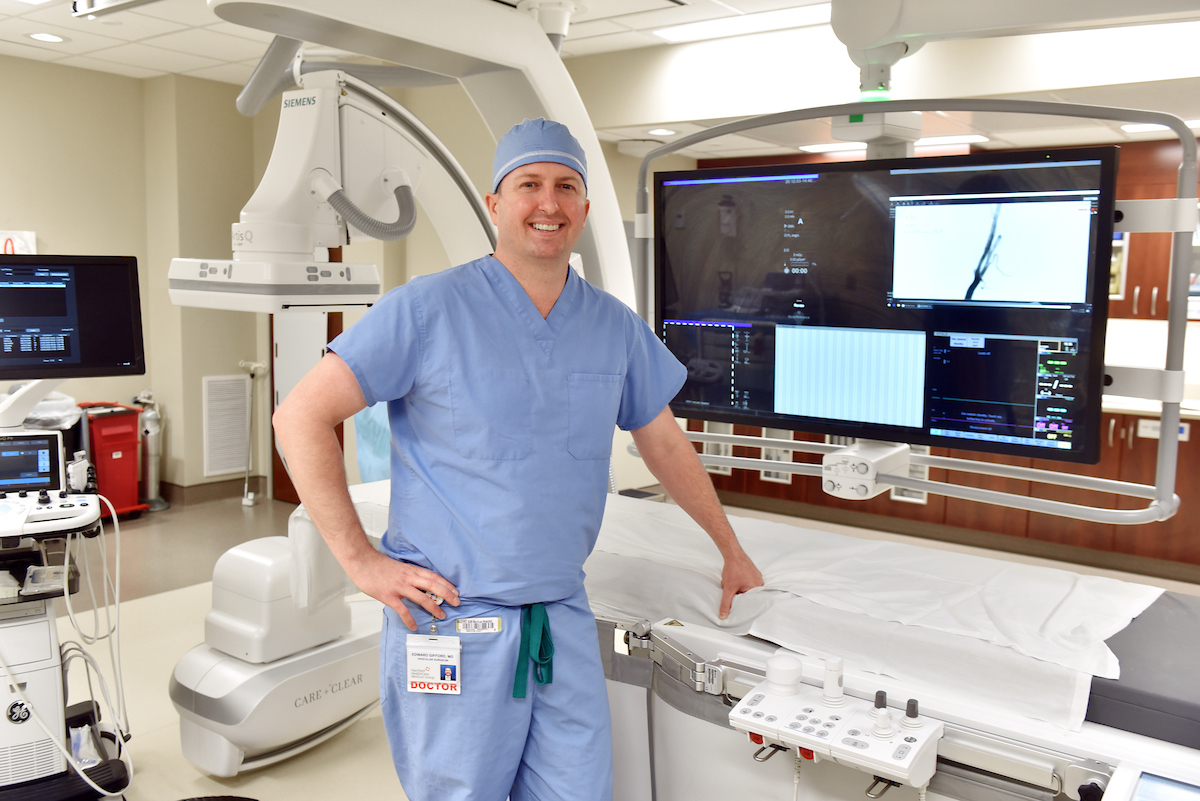<< Back
TCAR: At Backus Hospital, a New Way to Stop Carotid Artery Blockage, Prevent Stroke

December 21, 2020
For many of the 500,000 Americans who suffer a stroke annually, time is of the essence for effective treatment. A fairly new procedure that can reduce the risk of stroke in many patients called Transcarotid Artery Revascularization (TCAR) is now available at Backus Hospital in Norwich.
Vascular surgeon Dr. Edward D. Gifford says he and his partners have been performing the procedure for about three years at Hartford Hospital, and since July 2020 at Backus.
“We do the TCAR to alleviate blockage in the patient’s carotid artery,” he said. “We want to alleviate that blockage because in up to 25 percent of strokes, that’s the main culprit. We clear that artery out to prevent a future stroke.”
There are two options when treating a stroke patient, Gifford noted: carotid endarterectomy (CEA) and stenting. CEA, he said, is “the gold standard of treatment, but there are risks of bleeding or temporary or permanent nerve injury. Stenting is less invasive, but there is a higher risk of stroke occurring during the procedure than open surgery (CEA).”
TCAR, he said, is a minimally invasive stent that has the same low risk of another stroke as open surgery, but also has a faster recovery time because it is minimally invasive. The TCAR procedure is performed through a small incision at the neckline just above the clavicle.
Windham, Backus Receive Gold Plus Achievement Award for Stroke Care
The TCAR procedure uses a special transcarotid neuro-protection system (NPS) designed to reduce the risk of stroke during the insertion of the stent. The novel NPS device allows the surgeon to directly access the common carotid artery in the neck and initiate high-rate temporary blood flow reversal to protect the brain from stroke while delivering and implanting the stent.
The surgeon places a tube directly into the carotid artery and connects it to the NPS that directs blood flow away from the brain, to protect against plaque that may come loose reaching the brain.
Norwich resident Benjamin Lathrop, 72, had the TCAR procedure in January at Hartford Hospital. Lathrop, who has COPD, thought his inability to climb a flight of stairs without losing his breath and sometimes feeling as if he were about to pass out were caused by that disease. But tests showed he had an 85 percent blockage in his carotid artery. His cardiologist referred him to Dr. Gifford.
“I found him to be compassionate and very professional,” Lathrop said of Gifford. “He was very methodical and explained all the options. I received excellent care from start to finish.”
The best part, he said, is he feels so much better since his surgery, able to climb stairs and not lose his breath.
“My family wants me around for a long time,” Lathrop said.
Gifford said TCAR is a great option for higher-risk patients such as those with diabetes or who are older. The most important thing to remember about stroke treatment and prevention is, “timing is key. We have a saying, ‘Time is brain,’” Gifford said. “Whenever possible, we want to get you in the door in under three hours from the onset of symptoms.”